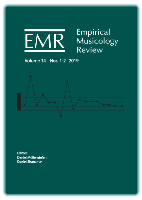
Empirical Musicology Review
Scope & Guideline
Exploring the Harmony of Empirical Research in Musicology
Introduction
Aims and Scopes
- Empirical Research in Musicology:
The journal emphasizes the importance of empirical methods in music research, encouraging studies that utilize both qualitative and quantitative approaches to investigate music theory, performance, and perception. - Interdisciplinary Approaches:
It fosters interdisciplinary research, integrating perspectives from psychology, cognitive science, sociology, and cultural studies to enrich the understanding of musical phenomena. - Corpus Studies and Data Analysis:
A significant focus is on the creation and analysis of musical corpora, utilizing large datasets to draw insights into musical patterns, styles, and trends across different genres and historical periods. - Cultural and Social Contexts of Music:
The journal explores how music interacts with cultural and social factors, examining issues of representation, identity, and bias within music research. - Technological Integration in Music Research:
It highlights the role of technology in music analysis, including computational approaches and data visualization techniques, to enhance research methodologies and findings.
Trending and Emerging
- Computational Music Analysis:
There is a growing trend towards the use of computational methods in music analysis, as seen in studies that apply algorithmic techniques to understand musical structures and patterns. - Emotional and Psychological Aspects of Music:
Recent publications show an increasing interest in exploring the emotional and psychological effects of music, including how different genres and styles evoke specific emotional responses. - Diversity and Representation in Music Research:
A noticeable rise in research focusing on diversity, including racial, ethnic, and gender representation in music, reflects a broader societal push for inclusivity and equity within the field. - Impact of Technology on Music Perception:
Emerging studies are examining how technology influences music perception and engagement, particularly in the context of digital music consumption and social media. - Interdisciplinary Collaborations:
There is a trend towards interdisciplinary collaborations, combining insights from various fields such as neuroscience, social sciences, and cultural studies to provide a more comprehensive understanding of music.
Declining or Waning
- Traditional Musicology:
There has been a noticeable decrease in studies that solely focus on traditional musicological analysis without incorporating empirical methods or interdisciplinary approaches. - Historical Music Theory:
Research centered exclusively on historical theoretical frameworks, without empirical validation or contemporary relevance, seems to be less prevalent, indicating a shift towards more applied and empirical studies. - Subjective Interpretations of Music:
Papers that rely heavily on subjective interpretations of music without empirical backing have become less common, as the journal increasingly prioritizes data-driven research.
Similar Journals
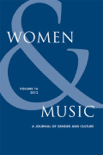
Women and Music-A Journal of Gender and Culture
Fostering Inclusive Scholarship in Gender and the ArtsWomen and Music: A Journal of Gender and Culture is a pioneering academic journal published by University of Nebraska Press, focusing on the intersection of gender and music. With a commitment to exploring issues pertinent to women and music in a range of cultural contexts, this journal provides a critical platform for scholars, musicians, and educators to share research that enriches our understanding of gender dynamics within the music industry and music's role in society. While currently not an open-access journal, it aims to make significant contributions to gender studies, cultural studies, and musicology, attracting a dedicated readership from various backgrounds. The journal is essential for those interested in feminist musicology and gender representation in the arts, fostering discourse that challenges traditional narratives and promotes inclusive scholarship. By bringing together diverse perspectives and innovative research, Women and Music continues to push boundaries and foster important conversations within both academic and artistic communities.
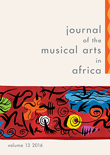
Journal of the Musical Arts in Africa
Unveiling the Richness of African SoundscapesThe Journal of the Musical Arts in Africa is a premier academic publication dedicated to exploring the rich and diverse musical traditions of the African continent. Published by ROUTLEDGE JOURNALS, TAYLOR & FRANCIS LTD, this journal offers a vital platform for researchers, professionals, and students in the field of musicology. With an ISSN of 1812-1004 and E-ISSN of 2070-626X, the journal has established itself as a significant contributor to the scholarly discourse surrounding African musical practices. With an impact factor reflecting its growing influence, the Journal of the Musical Arts in Africa is categorized in the Q3 quartile of music journals according to the latest metrics, placing it among an essential cadre of publications in the field. The journal invites original research articles, reviews, and critical essays that aim to expand the understanding of music as an integral part of African culture. It has been continuously publishing since 2004 and encompasses a wide range of topics, making it a must-read for anyone interested in the intersections of music, culture, and identity on the African continent. The journal stands as a testament to the vibrant musical heritage of Africa and encourages scholarly contributions that highlight the importance of music in reflecting and shaping societal values.
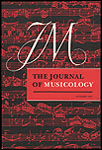
JOURNAL OF MUSICOLOGY
Advancing Knowledge in MusicologyJOURNAL OF MUSICOLOGY, published by UNIV CALIFORNIA PRESS, stands as a premier academic forum for the exploration and dissemination of research in the field of musicology. With an ISSN of 0277-9269, this journal provides a vital platform for scholars, practitioners, and educators to engage with contemporary and historical music studies. The journal, which has been publishing significant works since 1982 and continues through to 2024, boasts a commendable Q2 ranking in Music and holds a notable position within the 68th percentile of Scopus rankings for Arts and Humanities, specifically in Music. Although it does not offer open access, the journal remains a crucial resource for those dedicated to advancing the understanding of musical heritage, theory, and practice. The JOURNAL OF MUSICOLOGY aims to foster interdisciplinary dialogue and promote innovative methodologies within the field, thereby making it an essential read for all engaged in the scholarly pursuit of music.

Studi Musicali-Nuova Serie
Advancing Knowledge in the Art of SoundStudi Musicali-Nuova Serie is a distinguished academic journal dedicated to the field of musicology, published by the esteemed ACCAD NAZ SANTA CECILIA, FONDAZIONE. This journal serves as a platform for the dissemination of cutting-edge research and scholarly discourse surrounding various aspects of music, including historical, theoretical, and applied music studies. While the journal has contributed significantly to the field with its publication span from 2002 to 2009, it has since been recognized for its rigorous academic standards and its role in advancing knowledge in musicology. Despite its coverage being discontinued in Scopus, it continues to hold relevance among researchers, professionals, and students interested in the rich and diverse world of music. Situated in the heart of Rome, at the AUDITORIUM PARCO DELLA MUSICA, this journal embodies the vibrant cultural heritage of Italy while fostering international academic collaboration in music studies.

RIVISTA ITALIANA DI MUSICOLOGIA
Celebrating the Art and Science of Music StudiesRIVISTA ITALIANA DI MUSICOLOGIA, published by the Italian Society of Musicology, is a distinguished journal dedicated to the field of musicology, offering a platform for scholarly research and discourse on a wide array of musical topics. With an ISSN of 0035-6867 and an E-ISSN of 2036-5586, this journal has contributed significantly to the understanding of music in cultural and historical contexts. Although the scope of coverage was marked from 2003 to 2008 in renowned databases like Scopus, the journal continues to serve as an invaluable resource for researchers, educators, and students embroiled in music studies. Its emphasis on rigorous research and critical analysis makes it a vital asset for anyone seeking to deepen their knowledge of musicological inquiry. While not an open-access publication, the RIVISTA ITALIANA DI MUSICOLOGIA remains a prestigious outlet for scholarly contributions that reach audiences eager to explore the complexities of musical heritage.

MUSIKFORSCHUNG
Advancing Understanding Through Musical DiscourseMUSIKFORSCHUNG is a distinguished journal in the field of music studies, published by NEUWERK-BUCH UND MUSIKALIENHANDLUNG in Germany. With its ISSN 0027-4801, the journal caters to scholars, practitioners, and students interested in the diverse realms of musicology. Although it is currently not an Open Access publication, MUSIKFORSCHUNG plays a vital role in the academic landscape by disseminating research and critical discourse on music from various historical and contemporary perspectives. The journal has established its worth in the academic community, being categorized in the Q4 quartile in Music for 2023 and holding a rank of #169 out of 180 in the Scopus Arts and Humanities Music category, placing it within the 6th percentile. With publication activities spanning from 2002 to 2013 and resuming in 2016 through to 2024, MUSIKFORSCHUNG continues to be a crucial resource for those dedicated to advancing music scholarship. Set in the cultural heart of Kassel, Germany, the journal invites contributions that foster an understanding of music's impact on society and culture.

Resonancias
Empowering Scholars to Resonate Beyond Borders.Resonancias is a distinguished open-access journal published by the Pontificia Universidad Católica de Chile, dedicated to advancing the field of music studies. With an ISSN of 0717-3474 and an E-ISSN of 0719-5702, this journal has been promoting scholarly discourse in music since its transition to open access in 2014. Resonancias serves as a critical platform for researchers, professionals, and students alike, enabling them to disseminate knowledge and explore innovative perspectives in musicology. With its current Q2 ranking in the field of music as of 2023, and a Scopus ranking of #108 out of 180, this journal exemplifies its commitment to quality and impact within the academic community, fostering an accessible database of music research from Chile and beyond. Situated at AVENIDA VICUNA MACKENNA 4860, MACUL, SANTIAGO, CHILE, Resonancias not only promotes original research but also includes critical reviews, interviews, and essays that contribute to the rich tapestry of musical knowledge.

MUSICAL TIMES
Cultivating Scholarly Excellence in MusicologyMUSICAL TIMES is a distinguished journal dedicated to the exploration and dissemination of scholarly works in the realm of music, serving as an essential resource for researchers, professionals, and students alike. Published by MUSICAL TIMES PUBLICATIONS LTD, this journal has built a robust reputation within the arts and humanities, specifically focusing on music studies, with an impactful reach indicated by its Scopus ranking at #73 out of 106 in the field. Though access to this journal is not open, its curated content, which spans various facets of musicology and contemporary music discourse, enriches the academic community by encouraging insightful discussions and critical analyses. With its historical roots tracing back to its inception, MUSICAL TIMES aims to foster a deeper understanding of music's cultural, social, and artistic dimensions, making it a valued publication for those engaged in the scholarly pursuit of music.
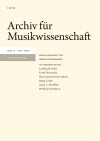
ARCHIV FUR MUSIKWISSENSCHAFT
Advancing Knowledge in Music Theory and HistoryARCHIV FUR MUSIKWISSENSCHAFT, the esteemed journal published by FRANZ STEINER VERLAG GMBH, serves as a significant platform for the dissemination of scholarly research in the field of musicology. With an ISSN of 0003-9292 and an established history of publication reaching back to 2002, this journal aims to explore various aspects of music theory, history, and ethnomusicology, contributing to academic discourse within a vibrant global community. Despite its designation in the Q4 category for music in 2023, the journal continues to foster innovative research and discussions among budding musicians, established academics, and music enthusiasts alike. While Open Access options are not currently available, the journal's offerings are enriched by a thorough review process aimed at maintaining high academic standards. Located in Stuttgart, Germany, at BIRKENWALDSTRASSE 44, D-70191, ARCHIV FUR MUSIKWISSENSCHAFT is committed to engaging its readers through insightful articles and reveals the evolving landscape of music scholarship while remaining a resourceful tool for researchers and students pursuing knowledge in this captivating field.

Oido Pensante
Bridging Theory and Practice in Music ResearchOido Pensante is a prominent open-access journal dedicated to the multifaceted field of music, published by the esteemed University of Buenos Aires, specifically through its Faculty of Philosophy and Letters, Institute of Anthropological Sciences. Since its inception in 2013, this journal has fostered a rich platform for scholarly discourse and innovative research at the intersection of music and cultural studies. With an ISSN of 2250-7116, Oido Pensante aims to bridge theoretical frameworks and practical applications, making significant contributions to the understanding of music in its social context. Currently, it holds an impressive Q3 ranking in the Arts and Humanities – Music category for 2023, with a Scopus rank of #99 out of 180 journals, reflecting its commitment to academic rigor and relevance. The journal's open access policy ensures that research is widely disseminated and accessible, making it an invaluable resource for researchers, professionals, and students alike in Argentina and beyond. With converged years from 2017 to 2024, Oido Pensante continues to expand its reach, encouraging intellectual exchange and stimulating dialogue within the music community.